New Class of Lang Opportunity Scholars Announced
As the newest recipients of the Eugene M. Lang Opportunity Scholarship, six Swarthmore sophomores will be tackling social-action projects around the globe.
"Our scholars in the Class of 2017 will pursue socially-valuable, entrepreneurial endeavors as nearby as Philadelphia and as far away as Iran," says Joy Charlton, executive director of the Lang Center for Civic and Social Responsibility, "and we are excited about the promise of their project designs."
"With the mentoring and resources available through the Lang Center, Lang Scholars gain the knowledge, connections, and skills needed to craft effective and innovative solutions to social problems," says Lang Scholar Advisor Jennifer Magee. "Whether building local capacity for action, providing packages of innovative products and services, or building a social movement, this new cohort will join the close to 200 previously-named Lang Scholars whose projects have collectively provided social value to thousands of people in communities all around the world since the early 1980s. We look forward to working with each scholar."
Tyler Alexander ‘17: Project Ké
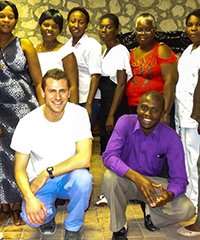 Project Ké is designed to improve Haiti’s healthcare system by establishing a CPR standard for Haitian healthcare providers and by creating an organization, in partnership with Haitian hospitals and communities, through which CPR can be taught and learned. Project Ké will retain CPR-certified instructors to teach the most up-to-date methods of CPR to classes of Haitian healthcare providers. Each class will contain an average of 12 students and last about two hours. In an effort to promote sustainability and self-sufficiency, Project Ké will train Haitians to become CPR instructors. Hence, Project Ké will eventually be able to run with minimal outside involvement. Training CPR instructors not only promotes sustainability, but provides much-needed jobs for Haitians, as well. Alexander is from Millburn, N.J.
Project Ké is designed to improve Haiti’s healthcare system by establishing a CPR standard for Haitian healthcare providers and by creating an organization, in partnership with Haitian hospitals and communities, through which CPR can be taught and learned. Project Ké will retain CPR-certified instructors to teach the most up-to-date methods of CPR to classes of Haitian healthcare providers. Each class will contain an average of 12 students and last about two hours. In an effort to promote sustainability and self-sufficiency, Project Ké will train Haitians to become CPR instructors. Hence, Project Ké will eventually be able to run with minimal outside involvement. Training CPR instructors not only promotes sustainability, but provides much-needed jobs for Haitians, as well. Alexander is from Millburn, N.J.
Raven Bennett ‘17: Rape Prevention through Early Education
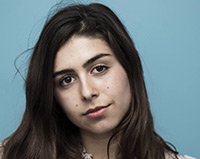 Rape Prevention through Early Education aims to prevent rape by delivering consent education to high school-aged youth. While most colleges present consent education programming to their incoming students, this preventative measure often comes too late. Adolescence is a formidable time in which the brain is still developing and positive representations of sexual violence in the media send negative messages to youth. Bennett’s demand-sensitive model of consent education — working in partnership with her hometown's Police Activities League in Santa Monica, Calif., — will address the issues at hand.
Rape Prevention through Early Education aims to prevent rape by delivering consent education to high school-aged youth. While most colleges present consent education programming to their incoming students, this preventative measure often comes too late. Adolescence is a formidable time in which the brain is still developing and positive representations of sexual violence in the media send negative messages to youth. Bennett’s demand-sensitive model of consent education — working in partnership with her hometown's Police Activities League in Santa Monica, Calif., — will address the issues at hand.
Fatima Boozarjomehri ‘17: Giving Wings: Bringing English Literacy and Cultural Understanding to Rural Iran
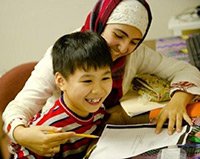 Boozarjomehri plans to scale up the summer 2014 English learning program she began in a rural village (Vavan) close to Tehran, Iran, with her Lang Project, Giving Wings: Bringing English Literacy and Cultural Understanding to Rural Iran. The average income of the individuals within such rural villages is lower than the national poverty line of $400 per month. The closest English institute is more than 25 km from the village, and tuition for one individual is equal to roughly one third of a family’s income. Students in this region do not have many other educational opportunities like learning a language and enhancing their skills in the subjects they enjoy more. The early evidence from Boozarjomehri’s English literacy pilot project is promising: The average comprehension on the diagnostic exam before this program for all levels was under 50 percent, and the average after the program was completed was over 87 percent. Replicating and extending this program’s effectiveness to seven additional villages in the area is one of Boozarjomehri’s main goals. Boozarjomehri, a member of the Swarthmore Islamic Society, is from Dobbs Ferry, N.Y.
Boozarjomehri plans to scale up the summer 2014 English learning program she began in a rural village (Vavan) close to Tehran, Iran, with her Lang Project, Giving Wings: Bringing English Literacy and Cultural Understanding to Rural Iran. The average income of the individuals within such rural villages is lower than the national poverty line of $400 per month. The closest English institute is more than 25 km from the village, and tuition for one individual is equal to roughly one third of a family’s income. Students in this region do not have many other educational opportunities like learning a language and enhancing their skills in the subjects they enjoy more. The early evidence from Boozarjomehri’s English literacy pilot project is promising: The average comprehension on the diagnostic exam before this program for all levels was under 50 percent, and the average after the program was completed was over 87 percent. Replicating and extending this program’s effectiveness to seven additional villages in the area is one of Boozarjomehri’s main goals. Boozarjomehri, a member of the Swarthmore Islamic Society, is from Dobbs Ferry, N.Y.
Bolutife Fakoya ‘17: The Abuja Science and Community Resource Centre
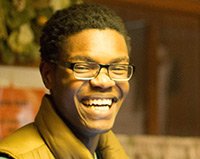 As much of the science that is taught in Abuja secondary schools is contained within classrooms and exam halls, there is little emphasis placed on the role that research has to play in the scientific process. Fakoya’s Lang Project, the Abuja Science and Community Resource Centre (ASCRC), will be a non-profit initiative that aims to provide an enriching environment where secondary school students in the Abuja region of Nigeria can explore the ways in which they can bridge the divide between their science education and their communities. By creating and deploying context appropriate science curricula that enrich rather than replace the science curricula currently in place in schools, the ASCRC will enable students to discover pathways in which the scientific principles they learn in school can be applied in ways that leave a positive impact in their communities. Fakoya, a writing associate and student academic mentor, is from Warri, Nigeria.
As much of the science that is taught in Abuja secondary schools is contained within classrooms and exam halls, there is little emphasis placed on the role that research has to play in the scientific process. Fakoya’s Lang Project, the Abuja Science and Community Resource Centre (ASCRC), will be a non-profit initiative that aims to provide an enriching environment where secondary school students in the Abuja region of Nigeria can explore the ways in which they can bridge the divide between their science education and their communities. By creating and deploying context appropriate science curricula that enrich rather than replace the science curricula currently in place in schools, the ASCRC will enable students to discover pathways in which the scientific principles they learn in school can be applied in ways that leave a positive impact in their communities. Fakoya, a writing associate and student academic mentor, is from Warri, Nigeria.
Chase Fuller ’17: Sabemos: Financial Empowerment for Recently Immigrated Communities
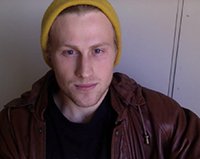 For his Lang Project, Fuller plans to develop a financial empowerment program, Sabemos, tailored to the needs of recently immigrated Latino communities in Philadelphia, Pa., and then to scale up the target population as the curriculum receives community input, gaining traction and nuance. The fundamental issue is one of access. Extensive bodies of research thoroughly detail safe personal finance habits. But this information is distributed in a structurally unequal way. Too often, recently immigrated peoples suffer from a disparity in power mediated through the unequal allocation of knowledge. At its broadest aspiration, Fuller’s project seeks to mitigate the asymmetrical distribution of financial information through accessible programming on specific, relevant aspects of economic life in the United States. Fuller, a member of the men's lacrosse team, is from Denver, Colo.
For his Lang Project, Fuller plans to develop a financial empowerment program, Sabemos, tailored to the needs of recently immigrated Latino communities in Philadelphia, Pa., and then to scale up the target population as the curriculum receives community input, gaining traction and nuance. The fundamental issue is one of access. Extensive bodies of research thoroughly detail safe personal finance habits. But this information is distributed in a structurally unequal way. Too often, recently immigrated peoples suffer from a disparity in power mediated through the unequal allocation of knowledge. At its broadest aspiration, Fuller’s project seeks to mitigate the asymmetrical distribution of financial information through accessible programming on specific, relevant aspects of economic life in the United States. Fuller, a member of the men's lacrosse team, is from Denver, Colo.
Sedinam Worlanyo ’17: NextGen Vocational Leaders
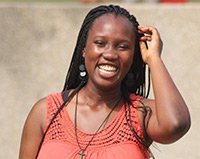 The rural village of Odoben in the Asikuma-Odoben-Brakwa district of Ghana experiences slow economic development which has resulted in rural-urban migration of the district members to urban cities like Accra, Worlanyo's hometown. Approximately 700 students attend the community’s sole senior high school; it is the only academic institution present within the district for training young people for the job market in this community. Graduating students lack knowledge in basic marketing, financial, technological, entrepreneurial, and innovation skills that they would need to thrive in their future careers. Worlanyo proposes to set up a dedicated entrepreneurial/ innovation space, NextGen Vocational Leaders, to develop an entrepreneur mentorship network, to provide instruction on digital literacy and entrepreneurial skills, and to arrange for apprenticeships. Worlanyo is a prospective computer science and economics major and is also a member of the gospel choir.
The rural village of Odoben in the Asikuma-Odoben-Brakwa district of Ghana experiences slow economic development which has resulted in rural-urban migration of the district members to urban cities like Accra, Worlanyo's hometown. Approximately 700 students attend the community’s sole senior high school; it is the only academic institution present within the district for training young people for the job market in this community. Graduating students lack knowledge in basic marketing, financial, technological, entrepreneurial, and innovation skills that they would need to thrive in their future careers. Worlanyo proposes to set up a dedicated entrepreneurial/ innovation space, NextGen Vocational Leaders, to develop an entrepreneur mentorship network, to provide instruction on digital literacy and entrepreneurial skills, and to arrange for apprenticeships. Worlanyo is a prospective computer science and economics major and is also a member of the gospel choir.
The Eugene M. Lang Opportunity Scholarship Program each year selects up to six members of Swarthmore's sophomore class as Lang Scholars. Selection criteria include distinguished academic and extra-curricular achievement, leadership qualities, and demonstrated commitment to civic and social responsibility. As its central feature, the program offers each scholar the opportunity and related funding to conceive, design, and carry out an opportunity project that creates a needed social resource and/or effects a significant social change or improved condition of a community in the United States or abroad. In addition, it offers each Scholar a diverse succession of undergraduate and graduate financial and other benefits. The program was conceived and endowed by Eugene M. Lang '38.


